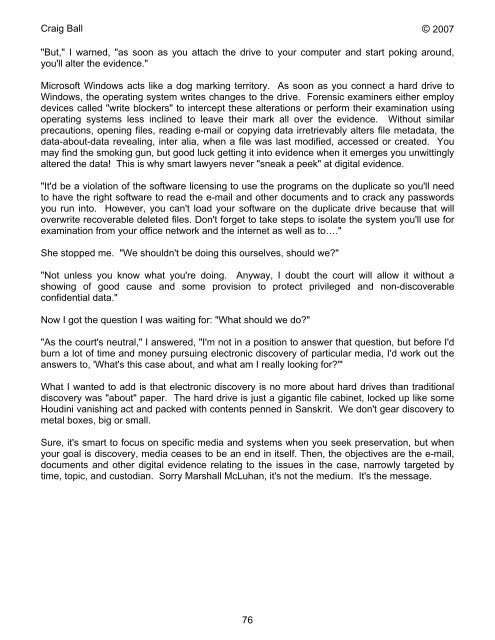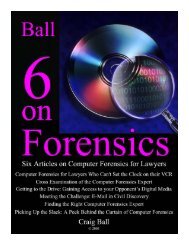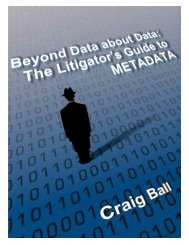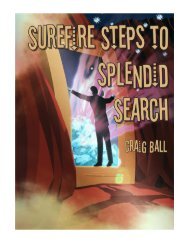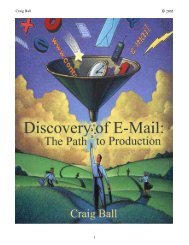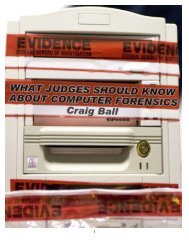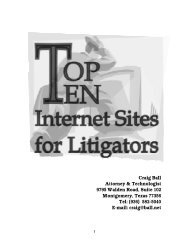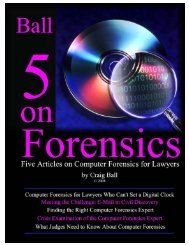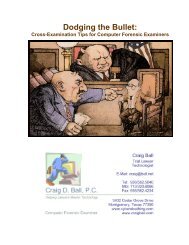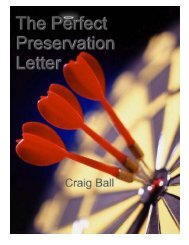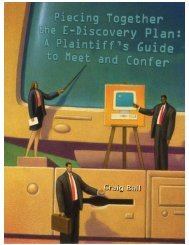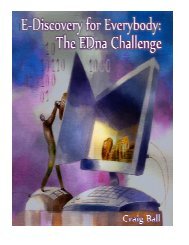Six Articles on Electronic - Craig Ball
Six Articles on Electronic - Craig Ball
Six Articles on Electronic - Craig Ball
Create successful ePaper yourself
Turn your PDF publications into a flip-book with our unique Google optimized e-Paper software.
<strong>Craig</strong> <strong>Ball</strong> © 2007<br />
"But," I warned, "as so<strong>on</strong> as you attach the drive to your computer and start poking around,<br />
you'll alter the evidence."<br />
Microsoft Windows acts like a dog marking territory. As so<strong>on</strong> as you c<strong>on</strong>nect a hard drive to<br />
Windows, the operating system writes changes to the drive. Forensic examiners either employ<br />
devices called "write blockers" to intercept these alterati<strong>on</strong>s or perform their examinati<strong>on</strong> using<br />
operating systems less inclined to leave their mark all over the evidence. Without similar<br />
precauti<strong>on</strong>s, opening files, reading e-mail or copying data irretrievably alters file metadata, the<br />
data-about-data revealing, inter alia, when a file was last modified, accessed or created. You<br />
may find the smoking gun, but good luck getting it into evidence when it emerges you unwittingly<br />
altered the data! This is why smart lawyers never "sneak a peek" at digital evidence.<br />
"It'd be a violati<strong>on</strong> of the software licensing to use the programs <strong>on</strong> the duplicate so you'll need<br />
to have the right software to read the e-mail and other documents and to crack any passwords<br />
you run into. However, you can't load your software <strong>on</strong> the duplicate drive because that will<br />
overwrite recoverable deleted files. D<strong>on</strong>'t forget to take steps to isolate the system you'll use for<br />
examinati<strong>on</strong> from your office network and the internet as well as to…."<br />
She stopped me. "We shouldn't be doing this ourselves, should we?"<br />
"Not unless you know what you're doing. Anyway, I doubt the court will allow it without a<br />
showing of good cause and some provisi<strong>on</strong> to protect privileged and n<strong>on</strong>-discoverable<br />
c<strong>on</strong>fidential data."<br />
Now I got the questi<strong>on</strong> I was waiting for: "What should we do?"<br />
"As the court's neutral," I answered, "I'm not in a positi<strong>on</strong> to answer that questi<strong>on</strong>, but before I'd<br />
burn a lot of time and m<strong>on</strong>ey pursuing electr<strong>on</strong>ic discovery of particular media, I'd work out the<br />
answers to, 'What's this case about, and what am I really looking for?'"<br />
What I wanted to add is that electr<strong>on</strong>ic discovery is no more about hard drives than traditi<strong>on</strong>al<br />
discovery was "about" paper. The hard drive is just a gigantic file cabinet, locked up like some<br />
Houdini vanishing act and packed with c<strong>on</strong>tents penned in Sanskrit. We d<strong>on</strong>'t gear discovery to<br />
metal boxes, big or small.<br />
Sure, it's smart to focus <strong>on</strong> specific media and systems when you seek preservati<strong>on</strong>, but when<br />
your goal is discovery, media ceases to be an end in itself. Then, the objectives are the e-mail,<br />
documents and other digital evidence relating to the issues in the case, narrowly targeted by<br />
time, topic, and custodian. Sorry Marshall McLuhan, it's not the medium. It's the message.<br />
76


